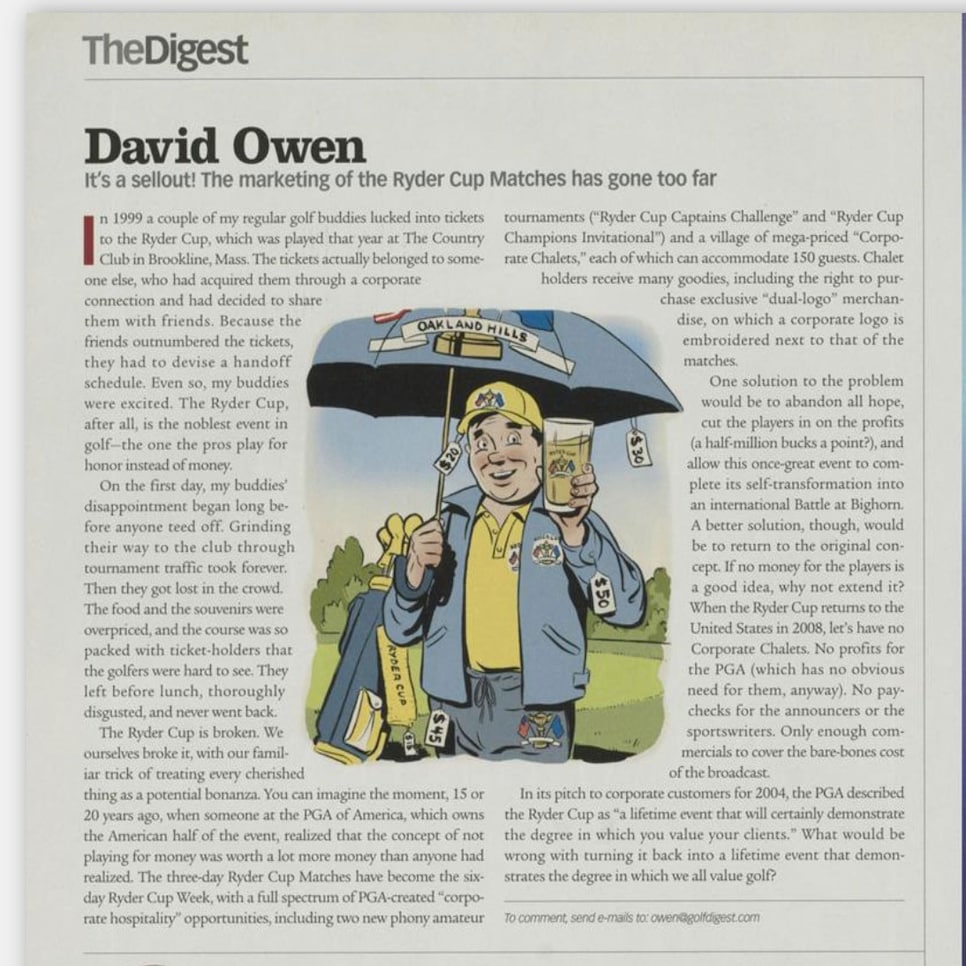The recent drama surrounding the exorbitant ticket prices for the 2025 Ryder Cup at Bethpage Black is hardly surprising to anyone who has been paying attention. This is the way sports are now. Overpriced. Over commercialized. Overdone in every which way imaginable. The biggest and best events are often built up to a point that they can’t possibly live up to the hype when they finally arrive. Especially when two plays in, or two golf shots struck, the broadcast is already cutting to commercial.
RELATED: How does your post-round routine compare with a tour pro’s?
It makes you wonder, it wasn’t always like this, right? Surely, the biennial event was still somewhat pure even just 20 short years ago?
Not quite.
Look through the Golf Digest Archive, available free to Golf Digest + subscribers, and you can find this excellent 2004 piece from legendary golf writer David Owen, raising concern with how the Ryder Cup was already steering into “doing wayyy too much” territory back in 1999 at The Country Club at Brookline. How perfect, and prophetic, is this headline we pulled from the archive: “It’s a sellout! The marketing of the Ryder Cup has gone too far”.
(Golf Digest+ members get access to the complete Golf Digest archive dating back to 1950. Sign up here.)
Reminder, this was written two decades ago. If Owen felt it had already gone too far by then, it’s no surprise it’s gotten to where it is now—where it costs more than $750 for a simple grounds past on a competition day. And the best (or worst?) part? Even after social-media uproar, which, believe it or not, sometimes gets things done these days, the PGA of America doubled down on the ridiculously expensive cost.
“In 1999, a couple of my regular golf buddies lucked into tickets to the Ryder Cup,” Owen wrote. “The tickets actually belonged to someone else, who had acquired them through a corporate connection and had decided to share them with friends.”
There’s those two spine-tingling words: “corporate connection.”
“Because the friends outnumbered the tickets, they had to devise a handoff schedule,” Owen continued. “Even so, my buddies were excited. The Ryder Cup, after all, is the noblest event in golf—the one the pros play for honor instead of money.”
Sound familiar?

“On the first day, my buddies’ disappointment began long before anyone teed off. Grinding their way through the tournament traffic took forever. Then they got lost in the crowd. The food and the souvenirs were overpriced, and the course was so packed with ticket-holders that the golfers were hard to see. They left before lunch, thoroughly disgusted, and never went back.”
RELATED: The Ryder Cup ticket price controversy, explained
Man, if that doesn’t sound like a very-likely scenario for many fans at Bethpage next year, we’re not sure what does. But hey, at least the $750 ticket comes with food and drinks (non-alcoholic drinks, don’t get too excited).
“The Ryder Cup is broken,” Owen claimed. “We ourselves broke it, with our familiar trick of treating every cherished thing as a potential bonanza. You can imagine the moment, 15 or 20 years ago, when someone at the PGA of America, which owns the American half of the event, realized that the concept of not playing for money was worth a lot more money than anyone had realized. The three-day Ryder Cup Matches have become the six-day Ryder Cup week, with a full spectrum of PGA-created ‘corporate hospitality’ opportunities, including two new phony amateur tournaments (‘Ryder Cup Captains Challenge’ and ‘Ryder Cup Champions Invitational’) and a village of mega-priced ‘Corporate Chalets,’ each of which can accommodate 150 guests. Chalet holders receive many goodies, including the right to purchase exclusive ‘dual-logo’ merchandise, on which a corporate logo is embroidered next to that of the matches.”
Man, the only thing Owen didn’t nail was that it would soon become the two-year Ryder Cup saga, which has included things like task forces and captains press conferences and photo opportunities and captain’s picks announcements and incessant debating about what went wrong and who didn’t get picked and why one team didn’t mesh quite like the other. It has become almost as nauseating to follow as the full week of nonsense that precedes the Super Bowl.
Owen attempted to offer up some solutions, one of which may actually come to fruition if Xander Schauffele and Patrick Cantlay have anything to say about it.
“One solution to the problem would be to abandon all hope, cut the players in on the profits (a half-million bucks a point?), and allow this once-great event to complete its self-transformation into an international Battle at Bighorn. A better solution, though, would be to return to the original concept. If no money for the players is a good idea, why not extend it? When the Ryder Cup returns to the United States in 2008, let’s have no Corporate Chalets. No profits for the PGA (which has no obvious need for them, anyway). No paychecks for the announcers or sportswriters. Only enough commercials to cover the bare bones of the broadcast.”
“In its pitch to corporate customers for 2004, the PGA described the Ryder Cup as a ‘lifetime event that will certainly demonstrate the degree in which you value your clients.’ What would be wrong with turning it back into a lifetime event that demonstrates the degree in which we all value golf?”
A valiant effort, David, but that ship sailed long ago.
This article was originally published on golfdigest.com

